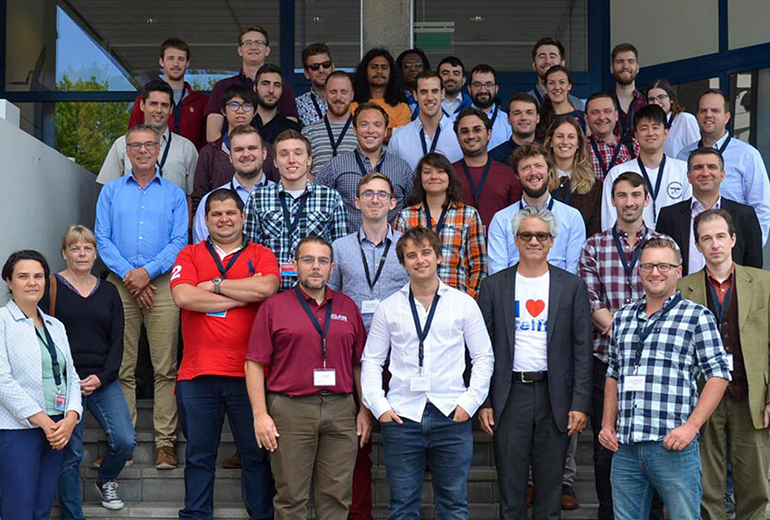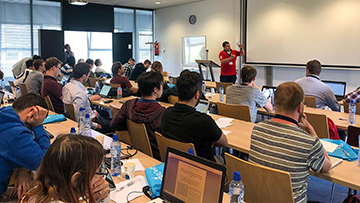
In July of 2019, Nuclear Science, Technology and Education for Molten Salt Reactors (NuSTEM) and Safety Assessment of MOlten salt FAst Reactor (SAMOFAR) led the Molten Salt Reactor (MSR) Summer Bootcamp on the campus of the Delft University of Technology in the Netherlands. This event brought together participants from universities across Europe and North America to learn more about MSRs through seminars, hands-on activities, a capstone assignment, a poster session and a round table presentation. Both NuSTEM and SAMOFAR are large-scale multi-institution research projects investigating MSR technologies with an eye to training new experts in this important field.
Dr. Jean Ragusa, professor of nuclear engineering at Texas A&M University, leads the NuSTEM project, which was funded by the Department of Energy’s Nuclear Energy University Program as an Integrated Research Program over three years. NuSTEM funds numerous faculty, researchers and students from Texas A&M, the University of California-Berkeley and the University of Wisconsin-Madison to contribute to the development of enabling technologies for molten salt reactor concepts and to educate young professionals in molten salt reactor technologies. Other Texas A&M nuclear engineering researchers working on the NuSTEM project include Dr. Mark Kimber, Dr. Cable Kurwitz, Dr. Sean McDeavitt, Dr. Luis Ortega, Dr. Lin Shao and Dr. Pavel Tsvetkov.
SAMOFAR is a consortium of 11 universities and research centers throughout Europe funded by EURATOM’s Horizon 2020 program and tasked with proving the innovative safety concepts of the molten salt fast reactor by advanced experimental and numerical techniques, delivering a breakthrough in nuclear safety and optimal waste management, and creating a consortium of stakeholders to demonstrate the molten salt fast reactor beyond SAMOFAR.
The workshop consisted of a series of five modules representing five major components of MSR research with faculty members actively working in each area presenting the modules.
“The bootcamp consisted of a thematic mixture of research topics related to MSRs,” said Dr. Mauricio Tano, visiting assistant professor in the nuclear engineering department at Texas A&M who participated in the event. “This included multiphysics, thermal-hydraulics, reactor control, materials, corrosion and the nuclear fuel cycle, among others.” Tano also found it “very enriching to be presented with the practices and challenges of each of these fields.”
In addition to these presentations, each module also included a hands-on practical exercise intended to teach the students and researchers a new skill that they could bring into their research.

“The summer school broke the traditional lecturing model,” said Texas A&M graduate student Mohammed Bani Ahmad, who works on the NuSTEM project with Kurwitz. “The workshop turned classes into interactive sessions where we solved problems and did calculations during class time. This kept us students involved and interested the whole time. Overall, it was an exceptional experience.”
The participants also worked together in teams throughout the session on capstone assignments. Each team developed an MSR research proposal in which they detailed the background to their research question, the methods they would use to investigate the topic, the impact of their proposed research, the resources needed to pursue their intended topics, along with potential timelines and milestones, the challenges to the topic and how they would handle quality assurance during the lifetime of the project. This exercise gave the participants valuable experience in writing a competitive proposal for research.
An award for best capstone submission went to the group of Franziska Schmidt (UC-Berkeley), Tano (Texas A&M) and Nicholas Winner (UC-Berkeley) for a project proposal titled “In situ Salt Composition Observation using Optical Techniques.” Peter German of Texas A&M won the award for best poster at the workshop.
Through working together on the capstone teams, presenting posters and talking about their research in round table discussions, participants in the Molten Salt Reactor Summer Bootcamp had the opportunity to share their work and network with other students and faculty in Europe and North America working on MSR research projects.
Ramiro Freile, a Texas A&M graduate student working on the NuSTEM project with Kimber, said “The connection with other students and professors who are working on the same project was extremely helpful. It allowed me to discuss about future projects and possible collaborations with research centers and universities from all over the world.”
